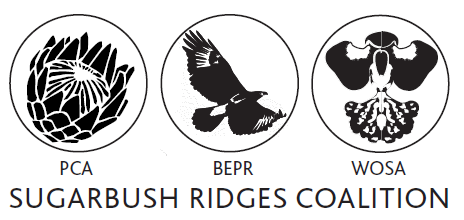Note that this document only contains a summary of the relevant Ordinances, Acts and Regulations and has no legal status. It has been prepared to give a brief overview of the legislation governing the indigenous orchids in Gauteng. For the exact wording refer to the full copy of the Ordinance, Act or Regulation published in the Government Gazette. These documents can be also obtained from the Provincial Administration.
Mpumalanga Nature Conservation Ordinance (Ord. 12 /1983)
1. Collection of indigenous orchids
No person shall collect any indigenous orchid unless he or she is in possession of a valid collecting permit from the Provincial Administration. Furthermore written permission to collect such indigenous orchids from the landowner must accompany the permit application.
Exceptions to this ruling are: the landowner may pick the flowers of an indigenous orchid on his or her property. This includes collecting indigenous orchids from land specifically set aside for the purpose of cultivating these protected plants or from land that is to be used for agricultural or housing purposes.
2. Buying and selling indigenous orchids
No person shall sell any indigenous orchid unless he or she is in possession of a valid selling permit from the Provincial Administration. No person shall buy an indigenous orchid unless the seller has a valid selling permit.
3. Donation of indigenous orchids
No person shall donate an indigenous orchid to another person without furnishing the recipient with a written document reflecting the following:
a) The full name and address of the donor and recipient.
b) The number and the names of the species of indigenous orchids donated.
c) The donation date.
d) The manner in which the donor came into possession of the plant.
e) The donor's signature.
4. Export and import of indigenous orchids
No person shall import any indigenous orchid into or export any indigenous orchid from Gauteng without a valid export or import permit from the Provincial Administration.
5. Conveyance of indigenous orchids
No person shall convey any indigenous orchid unless he or she has obtained a permit to do so previously or if the plant was bought legally or received as a donation. In both latter cases the person must be in possession of documentation proving that the plants were legally acquired.
CITES
CITES stands for the Convention for the International Trade in Endangered Species. The meeting at which the CITES agreement was drawn up was held in 1974. Various countries, including South Africa, are party to the Convention and thus bound to the legislation concerning the international trade in endangered species.
Species of plants and animals are categorised in three different appendices:
- Appendix I contains all species immediately threatened by extinction.
- Appendix II contains all those species that might become endangered if commercial trade is allowed. This includes all South African indigenous orchid species.
- Appendix III contains plant and animal species of which trade is to be monitored.
The species listed in these appendices may be up- or down listed depending on the condition of wild populations.
Indigenous orchid species that are to be exported to another country require valid CITES documentation. Without CITES documentation, the plants can be confiscated by the authorities of the country into which they are being imported. CITES documentation will only be provided if the owner of the plant can prove that it was obtained in accordance with the provincial legislation and the grower is registered as a flora grower with the relevant provincial authority. Permit and CITES applications must be done well ahead of time. Further requirements for the export of indigenous orchids are as follows:
1. Artificially raised seedlings in flask
No CITES certificate is required.
A phytosanitary certificate is required according to the regulations of the country that the flasks or plants are being sent to. Write to the country of destination well ahead of time to find out what their requirements are. These requirements are presented to the Directorate of Plant and Quality Control under the Department of Agriculture in the respective Province. Phone the Directorate beforehand and arrange for the inspection of the flasks. The phytosanitary certificate is issued by the Directorate on completion of the inspection.
An export permit is required as stipulated by the local nature conservation authority.
Inform the recipient so that he or she can obtain import permits according to the regulations of the country of destination if required.
2. Artificially raised plants out of flask
A CITES certificate is required for species and hybrids and can be applied for from the local nature conservation authority.
A phytosanitary certificate is required according to the regulations of the country that the flasks or plants are being sent to. Write to the country of destination well ahead of time to find out what their requirements are. These requirements are presented to the Directorate of Plant and Quality Control under the Department of Agriculture in the respective Province. Phone the Directorate beforehand and arrange for the inspection of the flasks. The phytosanitary certificate is issued by the Directorate on completion of the inspection.
An export permit is required as stipulated by the local nature conservation authority.
Inform the recipient so that he or she can obtain import permits according to the regulations of the country of destination if required.
National Environmental Management: Biodiversity Act (10/2004) & TOPS regulation
In addition to the above the regulations as stipulated in the NEMBA or National Environmental Management: Biodiversity Act (10/2004) and TOPS regulation (Threatened or Protected Species) must be adhered to.
Currently none of the indigenous orchids listed for Gauteng are listed as threatened or protected in NEMBA (10/2004) Notice 389 of 2013 published on 16 April 2013.

